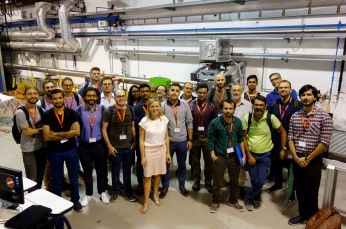The first international summer school between IHP – Innovations for High Performance Microelectronics and University of Rome Tor Vergata has been successfully finished. Under the topic “Photonic technologies for harsh environments and space applications” 18 participants from eight nations learned about novel microelectronic and photonic technologies which enable the future demands of the society for increasing high speed data transfer and broadband communication systems. Among the group of master and PhD students as well as postdocs has been also two women. “We got more than 30 applications for this really specific topic. The selected participants have been highly motivated and skilled and it was enriching to undergo this exiting week with them,” summarized Prof. Andreas Mai, one of the scientific heads of the summer school and also head of the Technology Department at IHP and Leader of the Joint Lab between IHP and University of Applied Science Wildau. The idea of a German-Italian summer school was born in the framework of the Joint Lab, which has a long time cooperation with the University of Rome Tor Vergata through the UAS Wildau.
From 25th to 31st of August the program offered lectures given by IHP scientists, Deutsches Luft- und Raumfahrtzentrum – DLR (German Aerospace Center), scientists of University of Rome Tor Vergata, Thales Alenia Space Agency and the National Institute for Nuclear Physics (INFN). Furthermore, the participants visited the Silicon Photonics Lab and the Cleanroom at IHP,as well as the National Institute for Nuclear Physics in Frascati and the Thales Alenia Space Center in Rome. There they got practical insights for example on high performance electronics for harsh environments, Silicon Photonics and their application in particle physics like Dark Matter research and use in Space Satellites. The program was completed by sightseeing tours in Frankfurt (Oder) and Rome and joint Dinners. “To get an inside view to recent developments in the field of photonics technologies, circuits and systems as well as novel developments and challenges for high performance technologies in harsh environments in such a concentrated way is quite challenging but motivating. A summer school is the best way to give an overview,” stated Prof. Mauro Casalbolni, scientific head of the summer school on the side of University of Rome Tor Vergata and Professor at the Bachelor and Master in Materials Science Courses.



